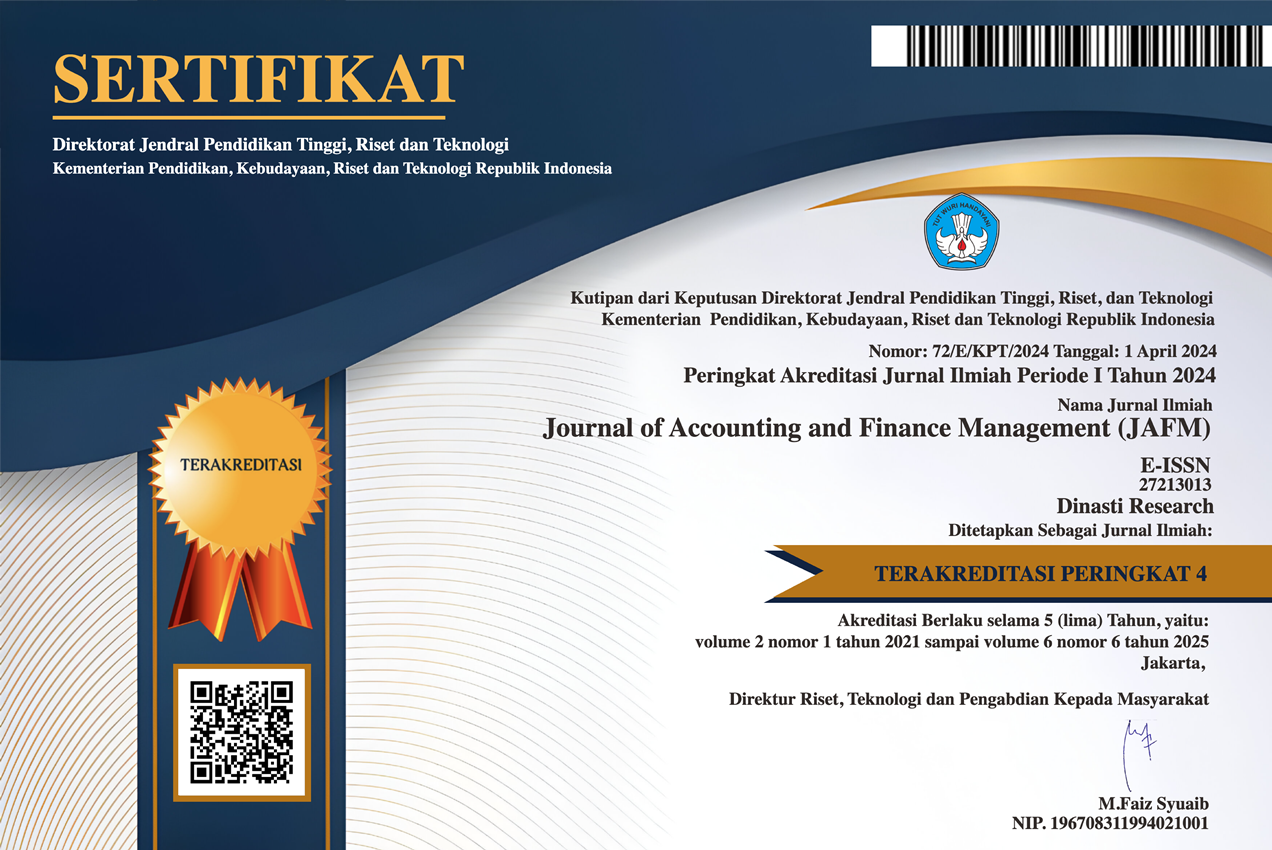Etika Bisnis Dalam Era Pasar Bebas: Systematic Literature Review Mengenai Implimentasi Nilai-Nilai Moral Dalam Sistem Ekonomi Liberal
DOI:
https://doi.org/10.38035/jafm.v6i4.2488Keywords:
Etika Bisnis, Pasar Bebas, Tanggung Jawab Sosial, Sistem Ekonomi LiberalAbstract
Era globalisasi dan liberalisasi ekonomi menciptakan kompleksitas dalam implementasi nilai-nilai moral pada sistem pasar bebas yang mengutamakan efisiensi ekonomi. Penelitian ini menggunakan metodologi Systematic Literature Review dengan protokol PRISMA untuk menganalisis 20 artikel akademik periode 2021-2025 yang membahas etika bisnis dalam konteks ekonomi liberal. Hasil penelitian menunjukkan evolusi konsep etika bisnis dari pendekatan reaktif menuju proaktif strategis, dengan Corporate Social Responsibility menjadi driver inovasi dan competitive advantage. Temuan mengidentifikasi tantangan utama berupa kesenjangan teori dan praktik, perbedaan respons lintas budaya, dan ketegangan dalam platform economy. Framework integratif yang dikembangkan menekankan peran kepemimpinan etis, transparansi korporat, dan stakeholder engagement sebagai determinan keberhasilan implementasi nilai moral. Penelitian ini berkontribusi pada pengembangan kerangka teoritis yang mengintegrasikan dimensi etika dalam sistem ekonomi liberal secara berkelanjutan, memberikan panduan praktis bagi pengembangan strategi bisnis yang bertanggung jawab dalam era pasar bebas yang semakin kompleks dan dinamis.
References
Atal, M. R., Riach, K., Smith, C., & McMaster, R. (2024). Adam Smith: His continuing relevance for contemporary management thought. European Management Journal, 42(1), 4–10. https://doi.org/10.1016/j.emj.2024.01.005
Chalmers, D., Honecker, F., Johnson, D., & Milne, G. (2025). Entrepreneurship and ideology: Accelerationism, degrowth, and the emerging political economy of venture creation. Journal of Business Venturing Insights, August, e00566. https://doi.org/10.1016/j.jbvi.2025.e00566
Fülöp, M. T., Ionescu, C. A., & Topor, D. I. (2025). Digital business world and ethical dilemmas: a systematic literature review. Digital Finance, 7(1), 23–41. https://doi.org/10.1007/s42521-024-00119-y
Ghasemaghaei, M., & Kordzadeh, N. (2024). Understanding how algorithmic injustice leads to making discriminatory decisions: An obedience to authority perspective. Information and Management, 61(2), 103921. https://doi.org/10.1016/j.im.2024.103921
Hernández-Cuadra, E., & Fernández-Fernández, J.-L. (2024). Ethics and compliance programs for a new business narrative: A Kohlberg-based moral valuing model for diagnosing commitment at the top. Business and Society Review, 129(1), 72–95. https://doi.org/https://doi.org/10.1111/basr.12345
Hunkin, E., & Alsen, P. (2024). Business as (un)usual: A critical policy and legal analysis of Australia’s COVID-19 ‘free childcare’ policy. Children and Youth Services Review, 159(February 2023), 107528. https://doi.org/10.1016/j.childyouth.2024.107528
Kabir, M. A., & Chowdhury, S. S. (2023). Empirical analysis of the corporate social responsibility and financial performance causal nexus: Evidence from the banking sector of Bangladesh. Asia Pacific Management Review, 28(1), 1–12. https://doi.org/10.1016/j.apmrv.2022.01.003
Kern, C. J., Poss, L., Kroenung, J., & Schönig, S. (2024). Navigating the moral maze: a literature review of ethical values in business process management. Business Process Management Journal, 30(8), 343–370. https://doi.org/10.1108/BPMJ-06-2024-0504
Kumar, V., Kumar, S., Chaudhuri, R., Chatterjee, S., & Vrontis, D. (2025). Mapping business ethics and society: A systematic journey into research and way forward. Business Ethics, the Environment & Responsibility, 34(4), 1487–1503. https://doi.org/https://doi.org/10.1111/beer.12731
Liu, B., & Liu, J. (2025). Did the integrity transition promote economic growth? Empirical research based on the perspective of anti-corruption approaches. International Review of Economics and Finance, 101(March), 104156. https://doi.org/10.1016/j.iref.2025.104156
Liu, Y., Heinberg, M., Huang, X., & Eisingerich, A. B. (2023). Building a competitive advantage based on transparency: When and why does transparency matter for corporate social responsibility? Business Horizons, 66(4), 517–527. https://doi.org/10.1016/j.bushor.2022.10.004
Luger, M., Hofer, K. M., & Floh, A. (2022). Support for corporate social responsibility among generation Y consumers in advanced versus emerging markets. International Business Review, 31(2), 101903. https://doi.org/10.1016/j.ibusrev.2021.101903
Meijer, Smit, K., & Marion. (2024). Global Survey on Business Ethics 2022-2024 - The Netherlands. In Global Survey of Business Ethics 2022-2024 : teaching, research and training. Vol. 3, Europe. https://doi.org/10.58863/20.500.12424/4316506
Nguyen, N. T. T., Nguyen, N. P., & Thanh Hoai, T. (2021). Ethical leadership, corporate social responsibility, firm reputation, and firm performance: A serial mediation model. Heliyon, 7(4), e06809. https://doi.org/10.1016/j.heliyon.2021.e06809
Rahman, M. H., Tanchangya, T., Rahman, J., Aktar, M. A., & Majumder, S. C. (2024). Corporate social responsibility and green financing behavior in Bangladesh: Towards sustainable tourism. Innovation and Green Development, 3(3), 100133. https://doi.org/10.1016/j.igd.2024.100133
Somuah, C. O., Mensah, H. K., Okyere, G. A., Gyimah, P., & Kamil, N. M. (2025). A Systematic Review on Socially Responsible Human Resource Management: Implications for Social Value Creation. Corporate Social Responsibility and Environmental Management, 32(4), 5102–5118. https://doi.org/https://doi.org/10.1002/csr.3229
Zander, U., Lu, L., & Chimenti, G. (2025). The platform economy and futures of market societies: Salient tensions in ecosystem evolution. Journal of Business Research, 189(January), 115037. https://doi.org/10.1016/j.jbusres.2024.115037
Downloads
Published
How to Cite
Issue
Section
License
Copyright (c) 2025 Irna Sulistiarini, Fatimah Fatimah, Iriani Ismail

This work is licensed under a Creative Commons Attribution 4.0 International License.
Authors who publish their manuscripts in this journal agree to the following conditions:
- The copyright on each article belongs to the author(s).
- The author acknowledges that the Journal of Accounting and Finance Management (JAFM) has the right to be the first to publish with a Creative Commons Attribution 4.0 International license (Attribution 4.0 International (CC BY 4.0).
- Authors can submit articles separately, arrange for the non-exclusive distribution of manuscripts that have been published in this journal into other versions (e.g., sent to the author's institutional repository, publication into books, etc.), by acknowledging that the manuscript has been published for the first time in the Journal of Accounting and Finance Management (JAFM).



























